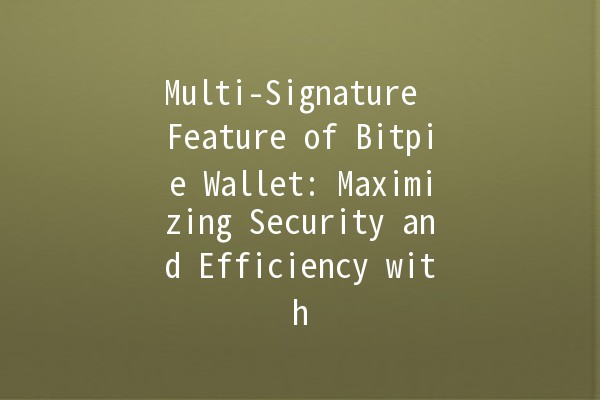




In today's digital landscape, securing your cryptocurrency assets is as crucial as ever. The Bitpie wallet has established itself as a robust platform favored by many crypto enthusiasts, thanks in part to its unique multisignature feature. This article aims to provide insight into the multisignature functionality of Bitpie Wallet, explore its practical applications, and share tips on how users can maximize their productivity and security through this feature.
A multisignature wallet, or multisig wallet, is a type of cryptocurrency wallet that requires multiple signatures (or approvals) before a transaction can be completed. This adds an added layer of security, as it prevents unauthorized access and significantly reduces the risk of theft or fraud. With multisignatures, a transaction can only be carried out if a specified number of private keys (owned by different parties) authorize it.

Bitpie wallet's multisignature feature allows users to create wallets that can be accessed by multiple parties. This is especially handy for businesses, investment groups, or individuals wishing to utilize a shared wallet for collaborative management of funds.
A practical example of Bitpie's multisignature wallet in action is a startup that uses it to manage company funds. The startup's team consists of three founders, and they establish a multisignature wallet requiring two signatures for any expenditure. This model ensures that funds can only be spent with a majority agreement, reducing the risk of fraud and promoting accountability among the founders.
Here are five techniques to leverage the multisignature feature in Bitpie Wallet to enhance your productivity:
Establish a clear approval process within your organization to streamline decisionmaking. By defining roles for each signer, your team can manage spending efficiently while maintaining security.
Example: Designate specific spending limits for each signer's approval level. This creates a structured approach while still ensuring a collective agreement for larger expenditures.
Bitpie Wallet allows users to implement timelocked transactions to enhance security further. This means even if a majority approves a transaction, it will only be executed after a predetermined period.
Example: For significant transactions, set a 24hour time lock to allow other cosigners to review and ensure that the transaction is legitimate before it goes through.
Utilize the transaction history feature to implement an auditing process. Regularly review who approved past transactions to ensure compliance and accountability.
Example: Schedule monthly reviews of transaction logs with all cosigners to discuss and assess the spending patterns and make note of any irregularities.
In case any keyholder loses their key or becomes unavailable, have a solid plan in place to regain access to the wallet without compromising security.
Example: Select a trusted individual outside of the primary group to hold a backup key in a secure manner, ensuring that they only have access in emergencies.
It is critical for all cosigners to understand security best practices to prevent potential security risks that come with managing a shared wallet.
Example: Conduct quarterly security training sessions for all keyholders to keep them updated on the latest security threats and preventative measures.
Multisignature wallets enhance security by requiring multiple signatures for transactions, reducing the risk of unauthorized transactions compared to wallets that rely on a single signature.
In such cases, if you have implemented a backup plan (like having a designated trusted individual with a backup key), the remaining signers can still access the wallet. However, you must ensure that procedures are in place for key recovery.
Absolutely! Multisignature wallets are ideal for businesses, as they ensure transparency and accountability over company expenditures by requiring multiple approvals.
Ensuring trust among cosigners is critical. Regular meetings, transaction reviews, and establishing clear roles can help maintain trust and accountability.
No, Bitpie provides an intuitive interface for setting up a multisignature wallet. Just follow the prompts to select wallet type, define signatures required, and invite cosigners.
Bitpie Wallet supports various cryptocurrencies, including Bitcoin, Ethereum, and many others. Always check the latest updates from Bitpie for the most current support information.
By taking advantage of the multisignature feature of Bitpie Wallet, users can significantly enhance the security of their cryptocurrency transactions while also promoting collaborative decisionmaking. Adopting these strategies will empower you to navigate the complex world of cryptocurrency safely and effectively, ensuring that your assets are protected against unauthorized access and enhancing your overall productivity.